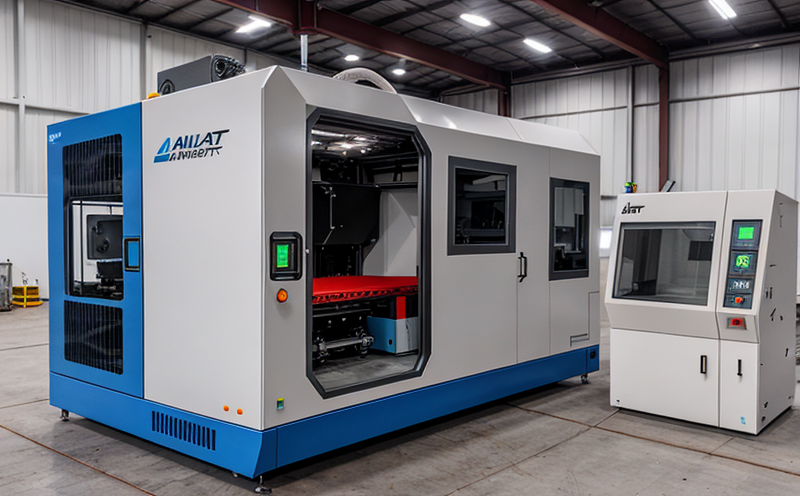ASTM F3001 Additive Manufacturing of Ti6Al4V Testing
The ASTM F3001 standard provides a comprehensive framework for testing and validating additive manufacturing (AM) processes, particularly focusing on the production of titanium alloys such as Ti6Al4V. This alloy is widely used in industrial manufacturing due to its excellent strength-to-weight ratio, corrosion resistance, and high-temperature performance. The ASTM F3001 standard ensures that parts manufactured using AM technologies meet the stringent requirements set forth by aerospace, automotive, and medical sectors.
The testing process under ASTM F3001 involves a series of rigorous evaluations aimed at ensuring part integrity and consistency with design specifications. Key tests include dimensional accuracy, mechanical properties, microstructure analysis, and residual stress measurement. These parameters are critical for maintaining the high standards required in industries where component failure can lead to catastrophic consequences.
Dimensional accuracy tests assess how closely the manufactured parts match the CAD model dimensions. This is crucial given the precision requirements of AM processes. Mechanical property testing ensures that the mechanical properties, such as tensile strength and yield strength, are within specified limits defined by ASTM F3001. Microstructure analysis helps identify any defects or inconsistencies in grain structure, which can significantly impact the material's performance.
Residual stress measurement is another critical aspect of this testing process. Excessive residual stresses can lead to part failure under operational conditions. By quantifying these stresses, manufacturers can optimize post-processing techniques such as heat treatment and surface treatments to minimize their impact on component integrity.
The ASTM F3001 standard also emphasizes the importance of proper specimen preparation for accurate testing results. Specimens are typically cut from the manufactured parts using controlled methods to ensure representative samples that accurately reflect the overall quality of the part. The choice of cutting method and orientation can significantly affect test outcomes, underscoring the need for precise sample preparation.
Instrumentation plays a pivotal role in ASTM F3001 testing. Advanced non-destructive testing (NDT) techniques like X-ray diffraction (XRD), electron backscatter diffraction (EBSD), and optical microscopy are commonly used to analyze microstructure and residual stresses. Tensile testers and hardness testers provide the necessary data on mechanical properties, ensuring compliance with the standards.
The ASTM F3001 standard is internationally recognized for its robustness in validating AM processes. Compliance not only ensures product quality but also opens doors to international markets where stringent regulatory requirements are enforced. This testing service supports manufacturers in achieving these high standards, thereby enhancing their reputation and market competitiveness.
Why It Matters
The ASTM F3001 standard is essential for ensuring the reliability and safety of parts manufactured through AM technologies. In industries like aerospace, where structural integrity is paramount, any defect in a titanium part could lead to catastrophic failures with potentially fatal consequences. By adhering to this standard, manufacturers can demonstrate that their processes produce parts that meet or exceed industry benchmarks.
The standard also plays a crucial role in fostering innovation by providing a structured framework for testing new AM materials and techniques. This encourages continuous improvement in the manufacturing process, leading to more efficient production methods and higher-quality products. Compliance with ASTM F3001 ensures that manufacturers are up-to-date with the latest industry practices and standards.
From a regulatory perspective, compliance with ASTM F3001 helps companies navigate complex global regulations. Many countries have adopted or are considering adopting similar standards to ensure product safety in critical applications. By meeting these standards, manufacturers can avoid costly delays and penalties associated with non-compliance.
The standard also contributes to sustainability efforts by promoting the use of AM technologies that minimize material waste and energy consumption. This aligns with broader industry goals of reducing environmental impact while maintaining high-quality outputs.
Competitive Advantage and Market Impact
Compliance with ASTM F3001 provides a significant competitive advantage in the industrial manufacturing sector. It allows companies to differentiate themselves by offering products that meet or exceed international standards, thereby gaining market share and customer trust.
The standard also supports strategic partnerships and collaborations between manufacturers, suppliers, and regulatory bodies. This collaboration ensures a seamless supply chain where all parties are aligned with industry best practices.
From an operational perspective, adherence to ASTM F3001 reduces the risk of production disruptions due to non-compliance issues. It streamlines quality control processes, ensuring that products consistently meet design specifications and regulatory requirements. This predictability enhances customer satisfaction and fosters long-term relationships with key stakeholders.
The standard's emphasis on continuous improvement encourages ongoing innovation within the manufacturing process. Companies that invest in this testing service are better positioned to introduce new materials and technologies, keeping them ahead of competitors who may not prioritize such investments.
Use Cases and Application Examples
The ASTM F3001 standard is particularly applicable in industries where the performance and reliability of titanium parts are critical. Aerospace manufacturers, for instance, rely on this testing to ensure that AM-produced components like engine parts and structural elements meet stringent safety standards.
In automotive manufacturing, compliance with ASTM F3001 helps in producing lightweight and high-performance parts such as exhaust systems and suspension components. This not only enhances vehicle performance but also contributes to fuel efficiency and reduced emissions.
The medical industry benefits from ASTM F3001 testing by ensuring that titanium implants and orthopedic devices are manufactured with precision and reliability. The standard's emphasis on microstructure analysis is particularly important in this sector, where even minor flaws could have severe implications for patient safety.
For defense contractors, compliance ensures the production of parts that meet the rigorous standards required for military applications. This includes components used in aircraft, naval vessels, and ground vehicles, all of which demand exceptional durability and reliability under extreme conditions.





